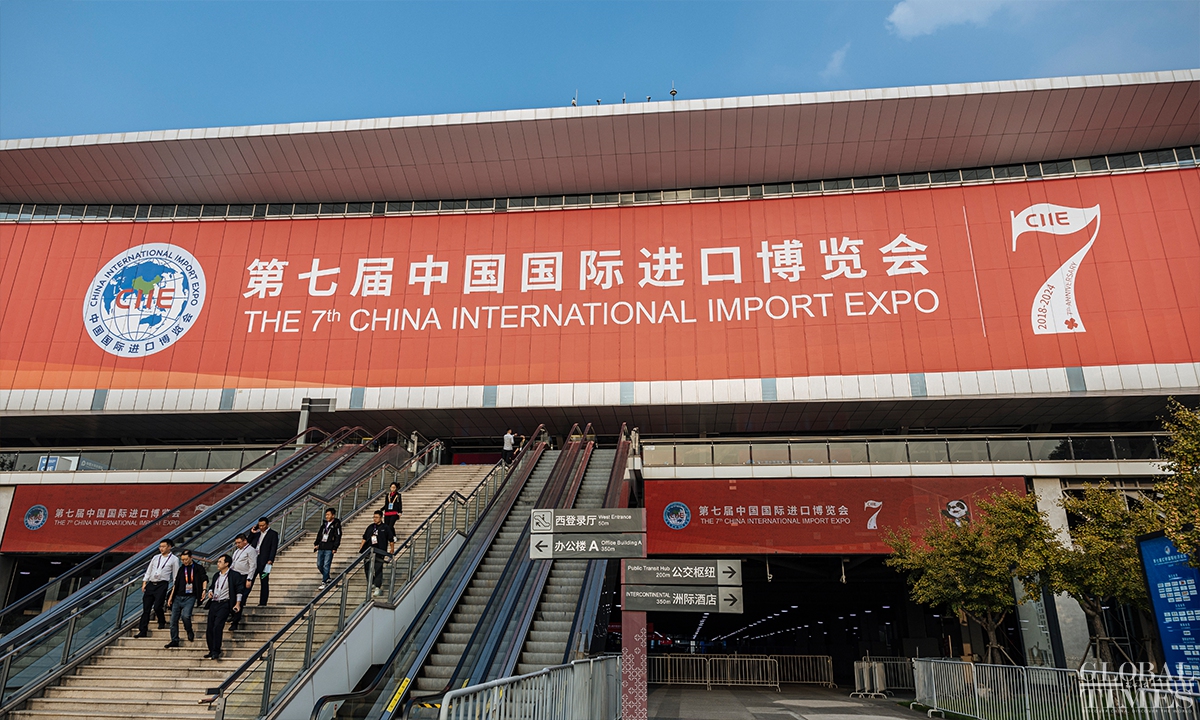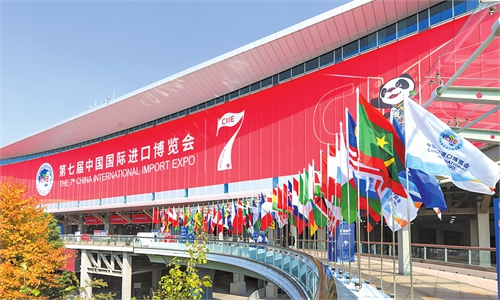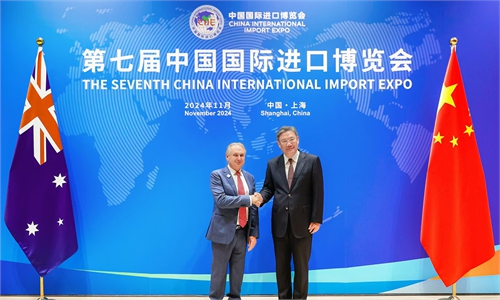There are profound dynamics of times behind CIIE’s growing success: Global Times editorial

Photo: Li Hao/GT
The seventh China International Import Expo (CIIE) will be held from Tuesday to Sunday in Shanghai. Themed "New Era, Shared Future," this year's event features an exhibition area of more than 420,000 square meters. It showcases exhibitors from more countries and regions, as well as a larger number of enterprises compared to the previous edition, including a record-breaking 297 Fortune Global 500 companies and industry leaders. As an important window for the expansion of China's opening-up, this year's CIIE will once again prove its significant influence in global trade with a series of record-breaking figures.By continuously providing public goods to the world through the constant release of the dividends of opening-up, the CIIE, as the world's first import-themed national-level expo, has become a major platform for China to share new development opportunities with the world. It has improved gradually over the past seven years. The previous six editions saw nearly 2,500 new products, technologies, and services make their debut, with a combined intended turnover reaching over $420 billion. The expo has facilitated precise matchmaking for more than 1,130 foreign enterprises and investment promotion agencies across different regions. Many exhibitors have gone on to open new stores, factories, and R&D centers in China. The reputation accumulated through these tangible achievements has made 186 enterprises and organizations participate in the CIIE for seven consecutive years, spreading its influence to more parts of the world through word of mouth. This enthusiasm not only represents a vote of confidence in the Chinese market but also supports inclusive and equitable economic globalization.
As globalization faces headwinds, China has established a super platform like the CIIE, with multinational companies showcasing their positions within it. For example, the total exhibition area of American companies at the CIIE has ranked first for several years. More and more American companies are gaining a better understanding of the Chinese market and deepening their engagement in it by participating in the expo. Furthermore, since the launch of the "Jinbo" China-Europe freight train in 2021, this is the fourth consecutive year that CIIE exhibits have been directly transported to Shanghai via the China-Europe freight train, making it more convenient for companies from Europe and neighboring countries to turn their exhibits into commercial products. Additionally, large multinational corporations such as L'Oréal, Volvo Cars, Mitsubishi Electric, 3M, and Louis Dreyfus have already secured their participation in next year's eighth CIIE, becoming part of the first group of "eight-year regulars."
The growing success of the CIIE reflects the profound dynamics of modern times. Today, trade liberalization and economic globalization face challenges from a wave of protectionism, widening geopolitical conflicts, an overstretched concept of national security, an increase in unilateralism measures and bullying practices, weakened cross-cultural identification, and heightened ethnic tensions. Nevertheless, the forces driving global openness continue to converge. Humanity remains hopeful for an open world economy, with positive factors promoting global openness continuing to accumulate. Digital technology and green development are facilitating international cooperation and opening new areas for collaboration. The rise of the "Global South" also strengthens support for expanding global openness. All these elements provide fundamental support for globalization to overcome anti-globalization tendencies.
Expanding global openness is not an easy task, and the most urgent aspect currently is to enhance international mutual trust and cooperation. This requires key platforms like the CIIE that promote exchanges among different countries and regions. This year, in addition to introducing a new materials section, the CIIE further promotes the participation of agricultural products from least developed countries, such as Tanzania and Benin, in the exhibition and sales. This concrete action helps to expand unilateral openness to the least developed countries and showcases China's genuine commitment to assisting "Global South" countries in modernizing and promoting common development among nations. Not only are more countries and enterprises participating, but international organizations such as the World Trade Organization (WTO) have also become regular attendees at the CIIE. China has truly transformed the CIIE into "not China's solo show, but rather a chorus involving countries from around the world."
At the end of this month, the second China International Supply Chain Expo (CISCE) will be held in Beijing. This year, it remains challenging for companies and organizations to secure a booth at the event due to its popularity. Over the years, China has gradually established several large-scale platforms, such as the China Import and Export Fair (Canton Fair), the CIIE, and the CISCE, providing an increasing number of public goods for the international community. In this process, the world has witnessed China's transformation from a "world factory" to a "global supermarket." China has also created a mega-mechanized platform for the world to share in its development opportunities, promoting win-win cooperation among countries. The continuous organization of these exhibitions is a true reflection of the Global Development Initiative.
History has repeatedly taught us that "openness brings progress, while self-seclusion leaves one behind" As the world's largest goods trading nation, China's further expansion of high-level opening-up is not only a proactive effort to build a new development pattern but also a move to actively uphold the multilateral trading system centered around the WTO. Through the CIIE, China will work with the world to pursue development and prosperity, supporting more countries in getting on board the "express train" of Chinese modernization.



